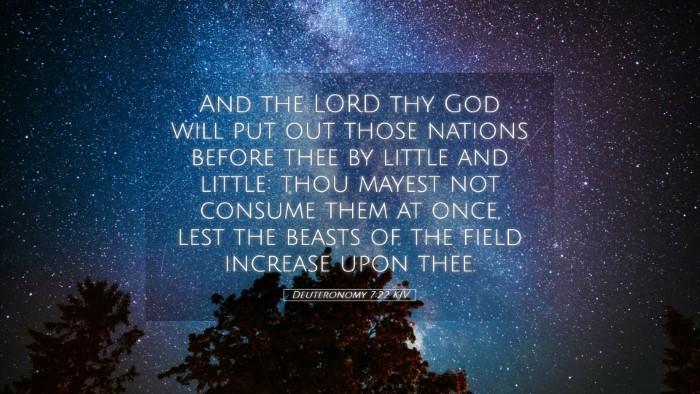Introduction
This verse is part of Moses' exhortation to the Israelites as they prepare to enter the Promised Land. It reflects God's providential method of leading his people to victory and emphasizes the principles of gradual conquest and reliance on divine assistance. Ancient commentaries provide expansive insights into its meaning and implications for both the original audience and contemporary readers.
Commentary Insights
1. The Nature of Gradual Conquest
Matthew Henry emphasizes that God's work is often gradual, allowing His people to grow stronger in faith and numbers as they face challenges. This aligns with the principle that spiritual maturity often requires time and experience. Henry notes that the slow removal of hostile nations illustrates God's wisdom: "If the conquest were sudden and complete, the Israelites might become complacent and fail to recognize their ongoing need for reliance upon God's providence."
2. Divine Governance and Protection
Albert Barnes explains that the "beasts of the field" mentioned in the verse represent the potential dangers that could arise if the land were vacated too quickly. The idea here is twofold: first, that God protects His people by pacing their victories, and second, that the land must be managed wisely. Barnes suggests that this is an illustration of God's governance in every stage of life—showing that He often does not remove all obstacles at once, maintaining a balance in creation.
3. Theological Implications
Adam Clarke provides a theological reflection on the meaning of divine timing. He mentions that the process of conquering the land represents the journey of spiritual warfare that each believer faces. Clarke’s insights suggest that believers might confront sin or trials in their lives incrementally, rather than all at once, allowing for deeper growth and understanding. He states: “This careful approach to victory illustrates God’s love and patience.”
4. Lessons for the Faithful
- Patience in Trials: Just as God led the Israelites slowly, His people today are encouraged to exercise patience during spiritual or personal trials.
- Reliance on God: The emphasis on divine help is a reminder that believers should not rely solely on their own strength but trust in God's timing and power.
- Strategic Planning: Reflecting on the wisdom of gradual conquest, pastors and leaders can apply this principle in church growth and community engagement.
Conclusion
Deuteronomy 7:22 serves as a rich theological resource that encourages believers to recognize God's hand in their struggles and victories. By combining insights from prominent biblical commentators, we see a multi-faceted understanding of God’s methods, encouraging growth, and the necessity of patience in the Christian life. As the Israelites were to trust in God’s timing and strategy, so too, modern believers are called to embrace God's plan for gradual transformation and victory in their own lives.


